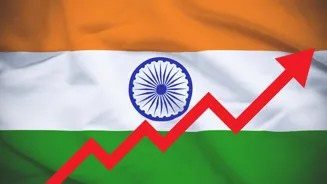The Organisation for Economic Cooperation and Development (OECD) has revised its outlook for India's economy, increasing the GDP growth forecast for 2025
from 6.3 per cent to a more optimistic 6.7 per cent. This upward revision reflects India’s robust domestic demand and the positive impact of Goods and Services Tax (GST) reforms. According to the OECD's latest World Economic Outlook, India’s growth trajectory is expected to remain steady, supported by accommodative monetary and fiscal policies. The report highlights that despite challenges posed by higher tariff rates, which may dampen exports, the overall economic activity will benefit from structural reforms, particularly in the GST system. Growth is projected to be 6.7 per cent in 2025 and slightly moderate to 6.2 per cent in 2026. Food Price Inflation Eases Thanks To Supply And Export Controls The OECD also points to a significant drop in food price inflation in India. This improvement is largely attributed to a strong domestic supply chain and strategic export restrictions, helping to stabilise prices for consumers. This development is a welcome relief amidst global inflationary pressures. Global Economic Landscape And Trade Concerns Globally, economic growth in the first half of 2025 has been more resilient than expected, especially across emerging markets. The OECD has raised its global growth forecast to 3.2 per cent for 2025 but kept the 2026 estimate steady at 2.9 per cent. However, uncertainties around trade, particularly due to US tariff increases, pose risks. The OECD notes that “the front-loading of goods production and trade ahead of the introduction of higher US tariff rates was an important source of support.” Yet, tariffs, which have reached an effective rate of 19.5 per cent by August 2025, the highest since the 1930s, are already impacting consumer behaviour, labour markets, and inflation trends worldwide. Looking forward, the OECD warns of potential challenges from further tariff hikes, inflation pressures, and financial market volatility. At the same time, easing trade restrictions or rapid advancements in AI technology could offer positive momentum.














